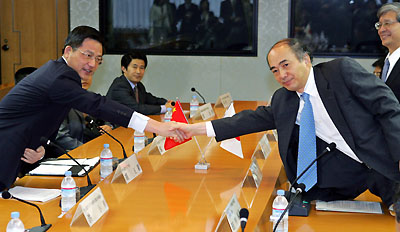China and Japan ended the sixth round of East China Sea talks at Beijing's
Diaoyutai State Guesthouse Sunday noon, but great differences still remained.

Hu Zhengyue (L)
chief of Chinese Foreign Ministry's Asian Affairs Department, and
Kenichiro Sasae, head of Japanese Foreign Ministry's Asia-Oceania Bureau,
shake hands as they start talks in Tokyo May 18, 2006.[File
Photo] |
The two sides acknowledged the importance of maintaining stability in the
East China Sea and agreed in principle to set up a maritime hotline to deal with
unpredictable situations in the area, a press release from China's Foreign
Ministry said.
Director of Chinese Foreign Ministry's Department of Asian Affairs Hu
Zhengyue and head of the Japanese Foreign Ministry's Asian and Oceanian Affairs
Bureau Kenichiro Sasae attended the talks as top negotiators.
The negotiators exchanged their views on the proposals of each side on
jointly exploring the resources of the East China Sea in a "frankly' way,
according to the press release.
Despite "great differences", the two sides agreed that the two-day talks are
conducive and pragmatic and will continue the negotiation process, according to
the press release.
Jin Xide, a researcher of Japan studies from the Chinese Academy of Social
Sciences, said the consensus of setting up a communication mechanism
demonstrated that both China and Japan hope to avoid conflicts in the area.
"This is a very positive step," he added.
The sixth round of talks has made headway, he said. "From the political
perspective, the two sides have agreed to continue the consultation; Technically
speaking, the negotiation has begun to touch upon very specific issues."
China and Japan have disputes over the demarcation of the East China Sea and
the Chinese side holds that such disputes should be solved through
consultations.
China and Japan have never conducted a demarcation of the East China Sea and
China doesn't recognize Japan's unilateral claim of a so-called "median line" in
the East China Sea, according to the Chinese Foreign Ministry.
China has also stressed that to shelve disputes and jointly explore the
region would be conducive to the stability of the East China Sea and the healthy
development of China-Japan ties.
The two countries have conducted five rounds of East China Sea talks since
October 2004. Last round of talks was conducted in Tokyo in
May.